Clearwater, FL Pollen and Allergy Report for Summer 2023
Pollen Allergy Trends in Clearwater, FL
When is pollen lowest in Clearwater, FL?

May
Lowest month total PPM
Avg. PPM
When is pollen highest in Clearwater, FL?

April
Highest month total PPM
Avg. PPM
How does pollen in Clearwater, FL compare to Florida?
Clearwater has a higher average PPM than the state of Florida.
Clearwater yearly avg PPM:
Florida yearly avg PPM:
How does pollen in Clearwater, FL compare to the USA?
Clearwater has a higher average PPM than the USA.
Clearwater yearly avg PPM:
USA yearly avg PPM:
Is pollen worse this year in Clearwater, FL?
Spring 2023 was better than spring 2022.
Spring 2023 PPM:
Spring 2022 PPM:
Average PPM in Clearwater, FL
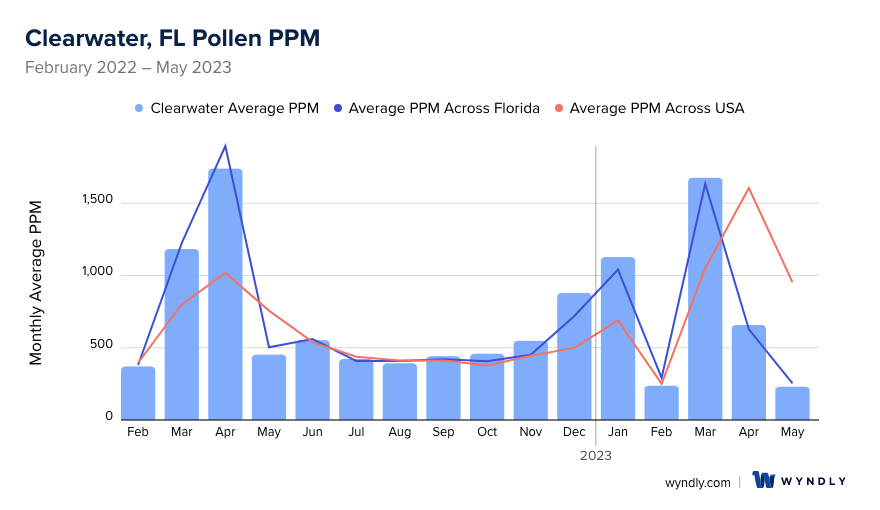
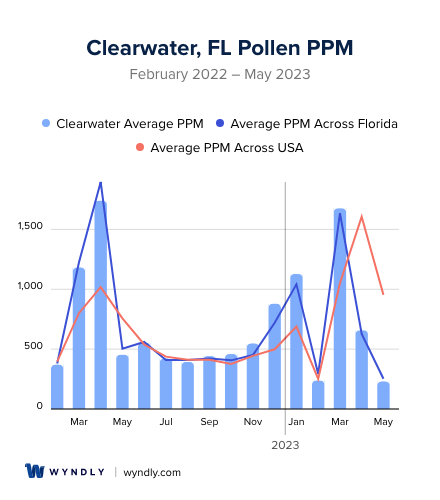
Clearwater, FL Pollen and Allergy Breakdown by Month
Grass
When is grass pollen highest in Clearwater, FL?
April has the highest grass pollen in Clearwater, FL with an average PPM of
When is grass pollen lowest in Clearwater, FL?
December has the lowest grass pollen in Clearwater, FL with an average PPM of
Tree
When is tree pollen highest in Clearwater, FL?
March has the highest tree pollen in Clearwater, FL with an average PPM of
When is tree pollen lowest in Clearwater, FL?
September has the lowest tree pollen in Clearwater, FL with an average PPM of
Weed
When is weed pollen highest in Clearwater, FL?
December has the highest weed pollen in Clearwater, FL with an average PPM of
When is weed pollen lowest in Clearwater, FL?
February has the lowest weed pollen in Clearwater, FL with an average PPM of
Clearwater, FL Pollen Monthly Breakdown by Pollen Type
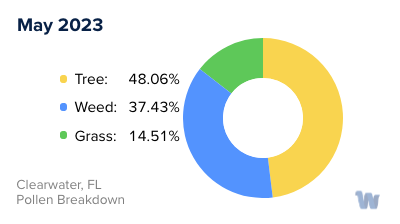
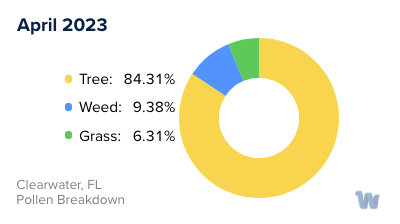
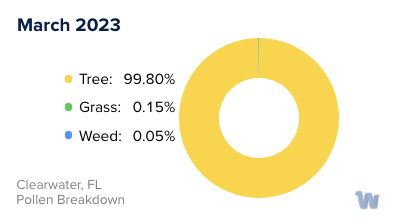
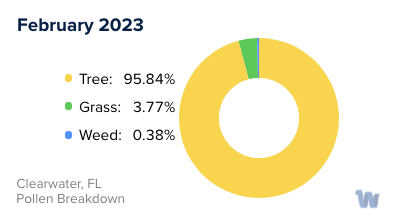
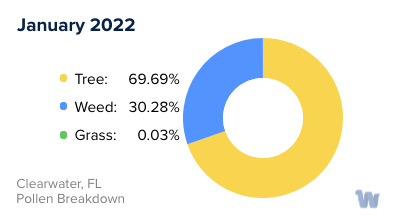
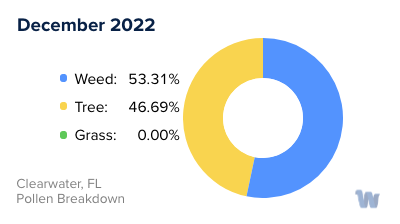
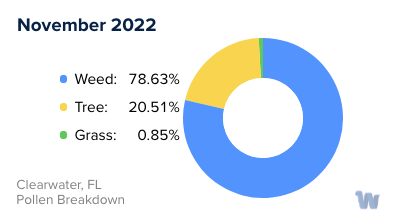
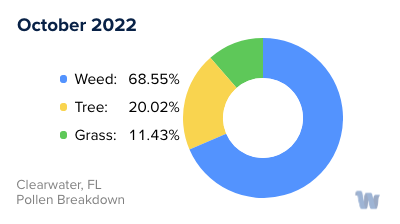
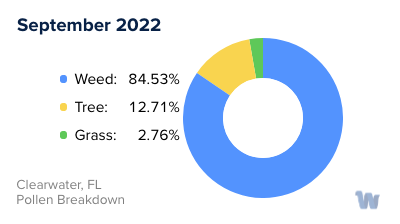
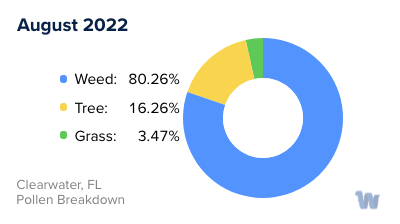
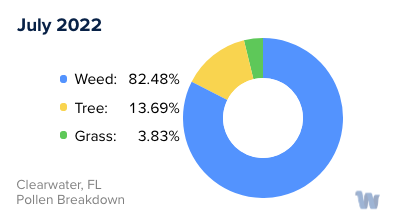
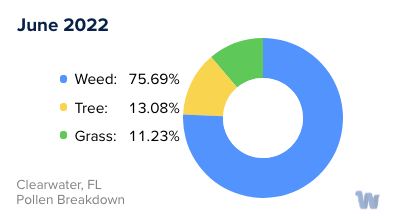
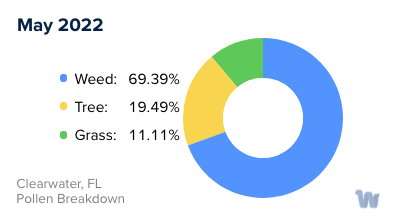
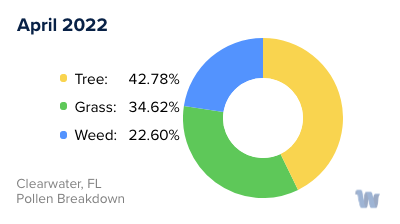
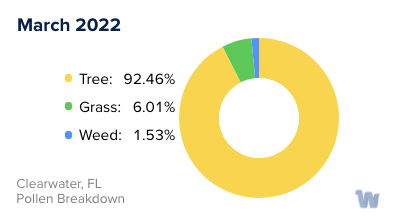
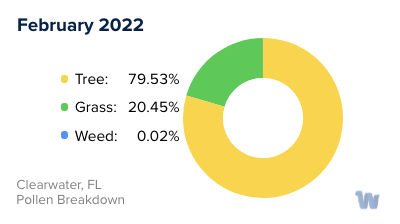
Pollen and Hay Fever in Clearwater, FL
If you're living in Clearwater, Florida, you're likely familiar with pollen allergies, also known as hay fever. This prevalent condition is caused by an immune response to pollen, microscopic particles produced by plants during their reproductive cycles. The Sunshine State, with its abundant flora, offers a unique and varied array of pollen types that can trigger such allergies.
The first thing to remember is that different plants produce pollen at different times of the year. Hence, the timing and severity of your allergies can greatly depend on the types of plants in your surroundings.
In Clearwater, one of the major contributors to pollen allergies is tree pollen. Oak, pine, and cedar trees are common in this area and are known for their high pollen production. These trees generally release their pollen in the spring, making this a particularly challenging time for residents with pollen allergies.
As we move into the summer, the pollen scene shifts from trees to grasses. Bermuda grass, bahia grass, and other types of grass commonly found in Florida lawns and fields become the primary pollen producers. These grasses can trigger allergic reactions that persist through the summer months.
Towards the end of the year, during the fall season, it's the weeds that take center stage. The biggest culprit is ragweed, a plant that thrives in the mild Florida fall climate and can produce a large amount of pollen. Other weeds like sagebrush and pigweed can also contribute to the pollen count.
The unique climate of Clearwater, with its warm temperatures and high humidity, can influence how these pollens are distributed. Warm, windy days are particularly notorious for spreading pollen far and wide, potentially increasing allergy symptoms even if you aren't in close proximity to the source plants.
In conclusion, pollen allergies in Clearwater are influenced by a variety of factors. The type of plant, the time of year, and the local weather conditions can all play a role in determining the severity of allergy symptoms. Understanding these factors can be a key step in managing your symptoms and maintaining your quality of life.

